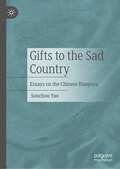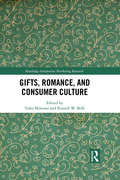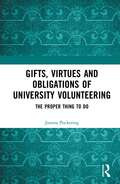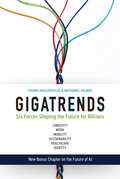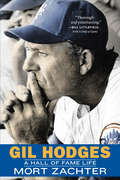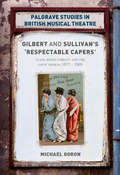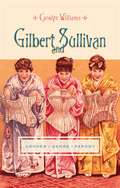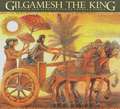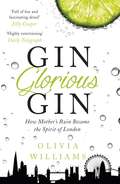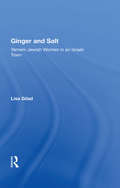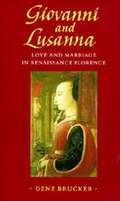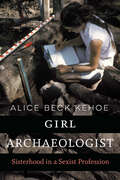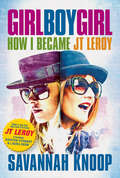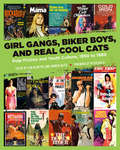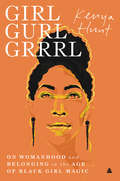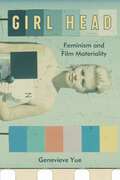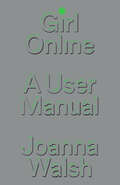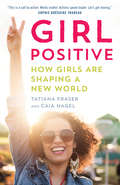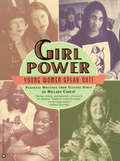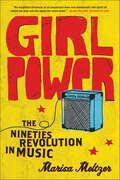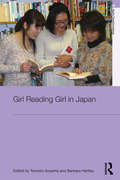- Table View
- List View
Gifts to the Sad Country: Essays on the Chinese Diaspora
by Souchou YaoThis book is a study of an ethnic-Chinese family in Malaysia as it struggled with the upheavals in China during the Land Reform (1945-1953) and the Great Leap Forward (1958-1962). Based on fieldwork in Malaysia and in a village in Dabu County, Southern China, it tells a story of a family whose existence straddled two nations, two political systems. Emigration is shown to be both a positive experience and a source of despair. The study redefines the conventional narrative about the Chinese diaspora as economically driven and politically expedient; mobility, personal freedom and transnational journeying were a part of their cultural history. The book highlights the fact that Chinese homeland, even under communist rule, offered the people a means of identification under difficult circumstances. During the time of radical reform, the diaspora adapted themselves to the conditions in the homeland, and for some China remained a place of longing and emotional attachment.
Gifts, Romance, and Consumer Culture (Routledge Interpretive Marketing Research)
by Russell W. Belk Yuko MinowaHow do people communicate their romantic feelings? Gift giving is one way. Giving and receiving of gifts is a characteristic of intimate relationships. Gifts are a message, a form of communication with a tangible material object, about love, affection, or concern for the recipient. The "romantic gift" evokes a multitude of intertwined meanings: passion, intimacy, affection, persuasion, care, celebration, altruism, and nostalgia. They can also connote the negative images of obligation and reciprocity. Romantic gift giving may be practiced at rituals, during rites of passage, or for casual occasions, to affirm the continued importance of the romantic relationship. We may even romanticize the giving of gifts to the self, to nonhuman companions, and to others we do not know personally. If loving and giving are a practice, then romantic gift giving is a practice of loving with intimate—or would-be intimate—others. This book addresses gift giving among consumers attempting to express and construct romantic love. It lies at the intersection of consumption, markets, and culture. In societies shaped by the globalizing neo-liberal economic order, increasing wealth disparity, and a partially digitized social environment that they help to co-construct, it may be time to rethink romantic love. Gift giving is a key arena to do so, as gifts make love tangible and act as carriers of meaning as well as cultural symbols. In gift giving the meanings of romance are renewed, renegotiated, and reconstructed. Gifts, Romance, And Consumer Culture demonstrates a wide variety of scholarly work bearing on romantic gift giving using an interpretive consumer research perspective. The book introduces critical studies by scholars in this unfolding and new interdisciplinary field.
Gifts, Virtues and Obligations of University Volunteering: The Proper Thing to Do
by Joanna PuckeringThis book takes a critical, grounded and ethnographic approach to elicit a deeper understanding of university volunteering. Anthropological theories of reciprocal gift exchange are used to re-visit some of the value-laden and at times conflicting ways of understanding volunteering as freely undertaken or coerced, altruistic or self-interested. It also explores how some of the changing uses and expectations of volunteering are related to the exercise of power and to the effect of social norms or structural constraints on agency. The book contains a detailed case study of a UK university, focusing on its relationships with local communities and voluntary organisations to illustrate the complex and culturally situated nature of volunteering and the gift. Joanna Puckering also draws on examples from countries such as the United States and Australia to address wider questions of why people do what they do, and why volunteering motives and outcomes attract differing interpretations. This volume will be relevant to scholars from anthropology, sociology and geography as well as those involved in the higher education and voluntary, corporate and social enterprise sectors.
Gigatrends: Six Forces That Are Changing the Future for Billions
by Thomas Koulopoulos Nathaniel PalmerGigatrends offers a roadmap for navigating six of the most disruptive trends shaping the future.Humanity stands at the precipice of a remarkable new era in global history filled with both immense opportunities and daunting challenges. Gigatrends examines how six disruptive trends can be harnessed to create new social, economic, and organizational solutions that will usher in the promise of a human-centered future for billions of people. But moving forward won&’t be easy. Gigatrends will disrupt nearly every existing socioeconomic system built over the past three hundred years. Navigating these seismic shifts will require a new set of skills, frameworks, and tools to help us move forward. Gigatrends will provide you with the insights to: • Understand how each of the six Gigatrends will shape your future • Predict how digital workers and AI will reshape the workforce • Create new social, economic, and organizational global ecosystems • Navigate the seismic shifts of a rapidly changing and uncertain world • Achieve a human-centered future that works for all of humanity • Recognize how digital identity will create a new era of prosperity The world is at an inflection point. It's time to understand and embrace the revolutionary power of Gigatrends to shape a future that&’s filled with hope and opportunity for all of humanity.
Gil Hodges: A Hall of Fame Life
by Mort ZachterIn descriptions of athletes, the word “hero” is bandied about and liberally attached to players with outstanding statistics and championship rings. Gil Hodges: A Hall of Fame Life is the story of a man who epitomized heroism in its truest meaning, holding values and personal interactions to be of utmost importance throughout his life—on the diamond, as a marine in World War II, and in his personal and civic life. A New York City icon and, with the Brooklyn Dodgers, one of the finest first basemen of all time, Gil Hodges (1924–72) managed the Washington Senators and later the New York Mets, leading the 1969 “Miracle Mets” to a World Series championship. A beloved baseball star, Hodges was also an ethical figure whose sturdy values both on and off the field once prompted a Brooklyn priest to tell his congregation to “go home, and say a prayer for Gil Hodges” in order to snap him out of the worst batting slump of his career.Mort Zachter examines Hodges’s playing and managing days, but perhaps more important, he unearths his true heroism by emphasizing the impact that Hodges’s humanity had on those around him on a daily basis. Hodges was a witty man with a dry sense of humor, and his dignity and humble sacrifice sometimes masked a temper that made Joe Torre refer to him as the “Quiet Inferno.” The honesty and integrity that made him so popular to so many remained his defining elements. Firsthand interviews of the many soldiers, friends, family, former teammates, players, and managers who knew and respected Hodges bring the totality of his life into full view, providing a rounded appreciation for this great man and ballplayer.
Gilbert and Sullivan's 'Respectable Capers'
by Michael GoronThis innovative account of the Gilbert and Sullivan partnership provides a unique insight into the experience of both attending and performing in the original productions of the most influential and enduring pieces of English-language musical theatre. In the 1870s, Savoy impresario Richard D'Oyly Carte astutely realized that a conscious move to respectability in a West End which, until then, had favored the racy delights of burlesque and French operetta, would attract a new, lucrative morally 'decent' audience. This book examines the commercial, material and human factors underlying the Victorian productions of the Savoy operas. Unusually for a book on 'G&S', it focuses on people and things rather than author biography or literary criticism. Examining theatre architecture, interior design, marketing, and typical audiences, as well as the working conditions and personal lives of the members of a Victorian theatre-company, 'Respectable Capers' explains how the Gilbert and Sullivan operas helped to transform the West End into the family-friendly 'theatre land' which still exists today.
Gilbert and Sullivan: Gender, Genre, Parody
by Carolyn WilliamsLong before the satirical comedy of The Daily Show and The Colbert Report, the comic operas of Gilbert and Sullivan were the hottest send-ups of the day's political and cultural obsessions. Gilbert and Sullivan's productions always rose to the level of social commentary, despite being impertinent, absurd, or inane. Some viewers may take them straight, but what looks like sexism or stereotype was actually a clever strategy of critique. Parody was a powerful weapon in the culture wars of late nineteenth-century England, and with defiantly in-your-face sophistication, Gilbert and Sullivan proved popular culture could be intellectually as well as politically challenging. Carolyn Williams underscores Gilbert and Sullivan's creative and acute understanding of cultural formations. Anxiety drives the troubled mind in the "nightmare" patter song of Iolanthe and is vividly realized in the sexual and economic phrasing of Lord Chancellor's lyrics. The modern body appears automated and performative in the "railway" song of Thespis, mirroring Charlie Chaplin's factory worker in the film, Modern Times. Williams also illuminates the use of magic in The Sorcerer, the parody of nautical melodrama in H.M.S. Pinafore, the ridicule of Victorian poetry in Patience, the autoethnography of The Mikado, the role of gender in Trial by Jury, and the theme of illegitimacy in The Pirates of Penzance.
Gilbert and Sullivan: Gender, Genre, Parody (Gender and Culture Series)
by Carolyn WilliamsLong before the satirical comedy of The Daily Show and The Colbert Report, the comic operas of W. S. Gilbert and Arthur Sullivan were the hottest send-ups of the day's political and cultural obsessions. Gilbert and Sullivan's productions always rose to the level of social commentary, despite being impertinent, absurd, or inane. Some viewers may take them straight, but what looks like sexism or stereotype was actually a clever strategy of critique. Parody was a powerful weapon in the culture wars of late-nineteenth-century England, and with defiantly in-your-face sophistication, Gilbert and Sullivan proved that popular culture can be intellectually as well as politically challenging.Carolyn Williams underscores Gilbert and Sullivan's creative and acute understanding of cultural formations. Her unique perspective shows how anxiety drives the troubled mind in the Lord Chancellor's "Nightmare Song" in Iolanthe and is vividly realized in the sexual and economic phrasing of the song's patter lyrics. The modern body appears automated and performative in the "Junction Song" in Thespis, anticipating Charlie Chaplin's factory worker in Modern Times. Williams also illuminates the use of magic in The Sorcerer, the parody of nautical melodrama in H.M.S. Pinafore, the ridicule of Victorian aesthetic and idyllic poetry in Patience, the autoethnography of The Mikado, the role of gender in Trial by Jury, and the theme of illegitimacy in The Pirates of Penzance. With her provocative reinterpretation of these artists and their work, Williams recasts our understanding of creativity in the late nineteenth century.
Gilgamesh The King
by Ludmila ZemanGilgamesh, half-god and half-man, in his loneliness and isolation becomes a cruel tyrant over the citizens of Uruk. To impress them forever he orders a great wall to be built, driving his people to exhaustion and despair so that they cry to the Sun God for help. In answer, another kind of man, Enkidu, is sent to earth to live among the animals and learn kindness from them. He falls in love with Shamhat, a singer from the temple, and he follows her back to Uruk. There, Enkidu, the "uncivilized" beast from the forest, shows the evil Gilgamesh through friendship what it means to be human.
Gimme Shelter
by Mary Elizabeth Williams"Of course I want a home," writes Mary Elizabeth Williams, "I'm American." Gimme Shelter is the first book to reveal how this primal desire, "encoded into our cultural DNA," drove our nation to extremes, from the heights of an unprecedented housing boom to the depths of an unparalleled crash. As a writer and parent in New York City, Williams is careful to ground her real-estate dreams in the reality of her middle-class bank account. Yet as a person who knows no other way to fall in love than at first sight, her relationship with the nation's most daunting housing market is a passionate one. Williams's house-hunting fantasy quickly morphs into a test of endurance, as her search for a place to live and a mortgage she can afford stretches into a three-year odyssey that takes her to the farthest reaches of the boroughs and the limits of her own patience. "Welcome to the tracks," she declares at the outset of yet another weekend tour of blindingly bad, wildly overpriced properties. "Let's go to the wrong side of them, shall we?" As her own quest unfolds, Williams simultaneously reports on the housing markets nationwide. Friends and family members grapple with real estate agents and lenders, neighborhood and quality-of-life issues, all the while voicing common concerns, as expressed by this Maryland working parent of three: "The market was so hot, there were no houses. We looked for years at places the owners wouldn't even clean, let alone fix up." How frustrating is the process? Williams likens it to hearing "the opening bars of a song you think is 'Super Freak.' And then it turns out to be 'U Can't Touch This.'" Told in an engaging blend of factfinding and memoir, Gimme Shelter charts the course of the real estate bubble as it floated ever upward, not with faceless numbers and documents but with the details of countless personal stories -- about the undeniable urge to put down roots and the lengths to which we'll go to find our way home.
Gin Glorious Gin: How Mother's Ruin Became the Spirit of London
by Olivia WilliamsGin Glorious Gin is a vibrant cultural history of London seen through the prism of its most iconic drink. Leading the reader through the underbelly of the Georgian city via the Gin Craze, detouring through the Empire (with a G&T in hand), to the emergence of cocktail bars in the West End, the story is brought right up to date with the resurgence of class in a glass - the Ginnaissance.As gin has crossed paths with Londoners of all classes and professions over the past three hundred years it has become shorthand for metropolitan glamour and alcoholic squalor in equal measure. In and out of both legality and popularity, gin is a drink that has seen it all.Gin Glorious Gin is quirky, informative, full of famous faces - from Dickens to Churchill, Hogarth to Dr Johnson - and introduces many previously unknown Londoners, hidden from history, who have shaped the city and its signature drink.
Gin Glorious Gin: How Mother's Ruin Became the Spirit of London
by Olivia WilliamsGin Glorious Gin is a vibrant cultural history of London seen through the prism of its most iconic drink. Leading the reader through the underbelly of the Georgian city via the Gin Craze, detouring through the Empire (with a G&T in hand), to the emergence of cocktail bars in the West End, the story is brought right up to date with the resurgence of class in a glass - the Ginnaissance.As gin has crossed paths with Londoners of all classes and professions over the past three hundred years it has become shorthand for metropolitan glamour and alcoholic squalor in equal measure. In and out of both legality and popularity, gin is a drink that has seen it all.Gin Glorious Gin is quirky, informative, full of famous faces - from Dickens to Churchill, Hogarth to Dr Johnson - and introduces many previously unknown Londoners, hidden from history, who have shaped the city and its signature drink.
Ginger And Salt: Yemeni Jewish Women In An Israeli Town
by Lisa GiladThis book focuses on women in development and the effects of the development process on women's roles and status. By considering women in the full context of their cultures, the book offers new insights on sociocultural, political, and economic change cross-culturally.
Giovanni and Lusanna: Love and Marriage in Renaissance Florence
by Gene BruckerAccount of a 1456 court case in which a woman complains her husband has just married another woman, which shows many customs and laws of love and marriage at that time.
Giraffe
by Anne Innis DaggIn the 1950s, Anne Innis Dagg was a young zoologist with a lifelong love of giraffe and a dream to study them in Africa. Based on extensive journals and letters home, Pursuing Giraffe vividly chronicles the realization of that dream and the year that she spent studying and documenting giraffe behaviour. Dagg was one of the first zoologists to study wild animals in Africa (before Jane Goodall and Dian Fossey); her memoir captures her youthful enthusiasm for her journey, as well as her näiveté about the complex social and political issues in Africa. Once in the field, she recorded the complexities of giraffe social relationships but also learned about human relationships in the context of apartheid in South Africa and colonialism in Tanganyika (Tanzania) and Kenya. Hospitality and friendship were readily extended to her as a white woman, but she was shocked by the racism of the colonial whites in Africa. Reflecting the twenty-three-year-old author's response to an "exotic" world far removed from the Toronto where she grew up, the book records her visits to Zanzibar and Victoria Falls and her climb of Mount Kilimanjaro. Pursuing Giraffe is a fascinating account that has much to say about the status of women in the mid-twentieth century. The book's foreword by South African novelist Mark Behr (author of The Smell of Apples and Embrace) provides further context for and insights into Dagg's narrative.
Girl Archaeologist: Sisterhood in a Sexist Profession
by Alice Beck KehoeGirl Archaeologist recounts Alice Kehoe&’s life, begun in an era very different from the twenty-first century in which she retired as an honored elder archaeologist. She persisted against entrenched patriarchy in her childhood, at Harvard University, and as she did fieldwork with her husband in the northern plains. A senior male professor attempted to quash Kehoe&’s career by raping her. Her Harvard professors refused to allow her to write a dissertation in archaeology. Universities paid her less than her male counterparts. Her husband refused to participate in housework or childcare. Working in archaeology and in the histories of American First Nations, Kehoe published a series of groundbreaking books and articles. Although she was denied a conventional career, through her unconventional breadth of research and her empathy with First Nations people she gained a wide circle of collaborators and colleagues. Throughout her career Kehoe found and fostered a sisterhood of feminists—strong, bright women archaeologists, anthropologists, and ethnohistorians who have been essential to the field.Girl Archaeologist is the story of how one woman pursued a professional career in a male-dominated field during a time of great change in American middle-class expectations for women.
Girl Boy Girl: How I Became JT Leroy
by Savannah KnoopThe JT LeRoy scandal is a story of our times. In January 2006, the New York Times unmasked Savannah Knoop as the face of the mysterious author JT LeRoy. A media frenzy ensued as JT's fans, mentors, and readers came to terms with the fact that the gay-male-ex-truck-stop-prostitute-turned literary-wunderkind was really a girl from San Francisco, whose sister-in-law wrote the books.Girl Boy Girl is the story of how Savannah Knoop led this bizarre double life for six years, trading a precarious existence as a college dropout for a life in which she was embraced by celebrities and artists--Carrie Fisher, Courtney Love, Mary Ellen Mark, Winona Ryder, Asia Argento, Sharon Olds, Gus Van Sant, Mike Pitt, Calvin Klein, and Shirley Manson, to name a few--and traveled the world. Telling her side of the story for the first time, Savannah reveals how being perceived as a boy gave her a sense of confidence and entitlement she never had before. Her love affair with Asia Argento is particularly wrenching, as they embark on an intimate relationship that causes more alienation than closeness.As Savannah and Laura struggle over control of the JT character, Savannah realizes the limits of the game - - and inadvertently finds herself through the adventure of being someone else.
Girl Gangs, Biker Boys, and Real Cool Cats: Pulp Fiction and Youth Culture, 1950 to 1980
by Peter Doyle Iain McIntyre Andrew NetteThe first comprehensive account of how the rise of postwar youth culture was depicted in mass-market pulp fiction. As the young created new styles in music, fashion, and culture, pulp fiction shadowed their every move, hyping and exploiting their behavior, dress, and language for mass consumption and cheap thrills. With their lurid covers and wild, action-packed plots, these books reveal as much about society's deepest desires and fears as they do about the subcultures themselves. Featuring approximately 400 full-color covers, many of them never before reprinted, along with 70 in-depth author interviews, illustrated biographies, and previously unpublished articles, the book goes behind the scenes to look at the authors and publishers, how they worked, where they drew their inspiration and—often overlooked—the actual words they wrote. It is a must read for anyone interested in pulp fiction, lost literary history, retro and subcultural style, and the history of postwar youth culture.
Girl Gurl Grrrl: On Womanhood and Belonging in the Age of Black Girl Magic
by Kenya Hunt“One of the year’s must-reads.” –ELLE“[A] provocative, heart-breaking, and frequently hilarious collection.” –GLAMOUR“Essential, vital, and urgent.” –HARPER’S BAZAARIn the vein of Roxane Gay’s Bad Feminist and Issa Rae’s The Misadventures of Awkward Black Girl, but wholly its own, a provocative, humorous, and, at times, heartbreaking collection of essays on what it means to be black, a woman, a mother, and a global citizen in today's ever-changing world.Black women have never been more visible or more publicly celebrated than they are now. But for every new milestone, every magazine cover, every box office record smashed, every new face elected to public office, the reality of everyday life for black women remains a complex, conflicted, contradiction-laden experience. An American journalist who has been living and working in London for a decade, Kenya Hunt has made a career of distilling moments, movements, and cultural moods into words. Her work takes the difficult and the indefinable and makes it accessible; it is razor sharp cultural observation threaded through evocative and relatable stories.Girl Gurl Grrrl both illuminates our current cultural moment and transcends it. Hunt captures the zeitgeist while also creating a timeless celebration of womanhood, of blackness, and the possibilities they both contain. She blends the popular and the personal, the frivolous and the momentous in a collection that truly reflects what it is to be living and thriving as a black woman today.
Girl Head: Feminism and Film Materiality
by Genevieve YueGirl Head shows how gender has had a surprising and persistent role in film production processes, well before the image ever appears onscreen.For decades, feminist film criticism has focused on issues of representation: images of women in film. But what are the feminist implications of the material object underlying that image, the filmstrip itself? What does feminist analysis have to offer in understanding the film image before it enters the realm of representation?Girl Head explores how gender and sexual difference have been deeply embedded within film materiality. In rich archival and technical detail, Yue examines three sites of technical film production: the film laboratory, editing practices, and the film archive. Within each site, she locates a common motif, the vanishing female body, which is transformed into material to be used in the making of a film. The book develops a theory of gender and film materiality through readings of narrative film, early cinema, experimental film, and moving image art.This original work of feminist media history shows how gender has had a persistent role in film production processes, well before the image ever appears onscreen.
Girl Online: A User Manual
by Joanna WalshWhat happens when a woman goes online? She becomes a girl.The unwritten contract of the internet, that a user is what is used, extends from the well-examined issue of data privacy and consent to the very selves women are encouraged to create in order to appear. Invited to self-construct as &“girls online,&” vloggers, bloggers and influencers sign a devil&’s bargain: a platform on the condition they commodify themselves, eternally youthful, cute and responsibility-free, hiding offline domestic, professional and emotional labour while paying for their online presence with &“accounts&” of personal &“experience.&” Told via the arresting personal narrative of one woman negotiating the (cyber)space between her identities as girl, mother, writer, and commodified online persona, Girl Online is written in a plethora of the online styles, from programming language to the blog/diary, from tweets to lyric prose, taking in selfies, social media, celebrity and Cyberfeminism.
Girl Positive: Supporting Girls to Shape a New World
by Caia Hagel Tatiana FraserShowcasing diverse voices of girls and young women from North America, Tatiana Fraser and Caia Hagel shift the focus from the media's sensationalist stories to highlight real-life accounts of how girls are making positive change and shaping a new world. Girl Positive takes an engaging, cutting-edge view of the cultural, social and political issues facing girls today. Looking closely at topics from social media, sexual violence, hypersexuality and cyberspace identities to girls transforming the world as leaders and agents of change, Girl Positive offers stories of struggle and victory, and brings to light where today's girls are finding new paths to empowerment. Fraser and Hagel explorethese insights and challenges with depth, compassion and a sense of adventure. The authors travelled from Montreal to Toronto, New Haven, Whitehorse, Los Angeles, Vancouver, San Francisco, Detroit and the Wemindji Cree Nation in northern Quebec, to hang out in coffee shops, dance studios, classrooms, gyms, skate parks, beaches andbedrooms, and talk with school girls, college students and young women in their early careers. Interspersed with their narratives are advice and input from experts in media, health, race and gender politics, sexuality, education and leadership. Each chapter also includes a Survival Kit, which offers tips and discussion questions for girls and the adults in their lives. Through Fraser and Hagel's journey readers will learn how to better equip themselves to support girls (and boys)--as parents, friends, educators, mentors and activists. Girl Positive celebrates all girls, illuminates emerging culture and fresh politics, and shows usthe future in the making.From the Hardcover edition.
Girl Power
by Hillary Carlip"In this extraordinary book you will discover the secrets and deepest needs of girls from all across the country - the thoughts, the fears, and the dreams of girls between the ages of thirteen and nineteen. You will hear from teen mothers and beauty queens, girl rappers and farm girls, surfers and sorority sisters. Theirs are voices that have too long gone unheard and unheeded, silenced and ignored. And now in this stunning collection they dare to reveal the things that will change your preconceptions and touch your heart."--BOOK JACKET.Title Summary field provided by Blackwell North America, Inc. All Rights Reserved
Girl Power: The Nineties Revolution in Music
by Marisa MeltzerIn the early nineties, riot grrrl exploded onto the underground music scene, inspiring girls to pick up an instrument, create fanzines, and become politically active. Rejecting both traditional gender roles and their parents' brand of feminism, riot grrrls celebrated and deconstructed femininity. The media went into a titillated frenzy covering followers who wrote "slut" on their bodies, wore frilly dresses with combat boots, and talked openly about sexual politics. The movement's message of "revolution girl-style now" soon filtered into the mainstream as "girl power," popularized by the Spice Girls and transformed into merchandising gold as shrunken T-shirts, lip glosses, and posable dolls. Though many criticized girl power as at best frivolous and at worst soulless and hypersexualized, Marisa Meltzer argues that it paved the way for today's generation of confident girls who are playing instruments and joining bands in record numbers. Girl Power examines the role of women in rock since the riot grrrl revolution, weaving Meltzer's personal anecdotes with interviews with key players such as Tobi Vail from Bikini Kill and Amy Ray of the Indigo Girls. Chronicling the legacy of artists such as Bratmobile, Sleater-Kinney, Alanis Morissette, Britney Spears, and, yes, the Spice Girls, Girl Power points the way for the future of women in rock.
Girl Reading Girl in Japan (Asia's Transformations)
by Tomoko Aoyama Barbara HartleyGirl Reading Girl provides the first overview of the cultural significance of girls and reading in modern and contemporary Japan with emphasis on the processes involved when girls read about other girls. The collection examines the reading practices of real life girls from differing social backgrounds throughout the twentieth century while a number of chapters also consider how fictional girls read attention is given to the diverse cultural representations of the girl, or shôjo, who are the objects of the reading desires of Japan’s real life and fictional girls. These representations appear in various genres, including prose fiction, such as Yoshiya Nobuko’s Flower Stories and Takemoto Nobara’s Kamikaze Girls, and manga, such as Yoshida Akimi’s The Cherry Orchard. This volume presents the work of pioneering women scholars in the field of girl studies including translations of a ground-breaking essay by Honda Masuko on reading girls and Kawasaki Kenko’s response to prejudicial masculine critiques of best-selling novelist, Yoshimoto Banana. Other topics range from the reception of Anne of Green Gables in Japan to girls who write and read male homoerotic narratives.
